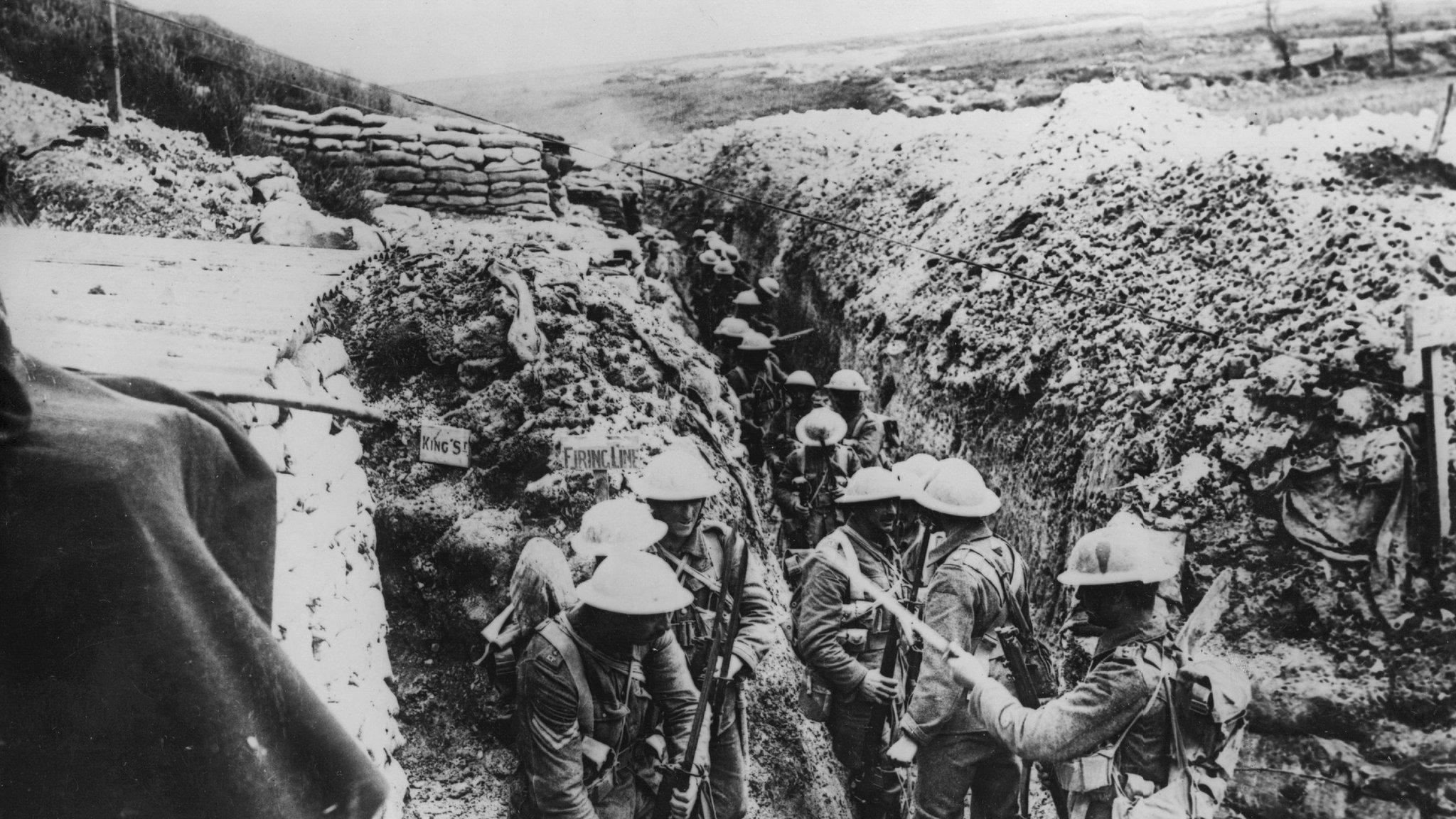Battle of the Somme: How newspapers brought news of casualties home
- Published
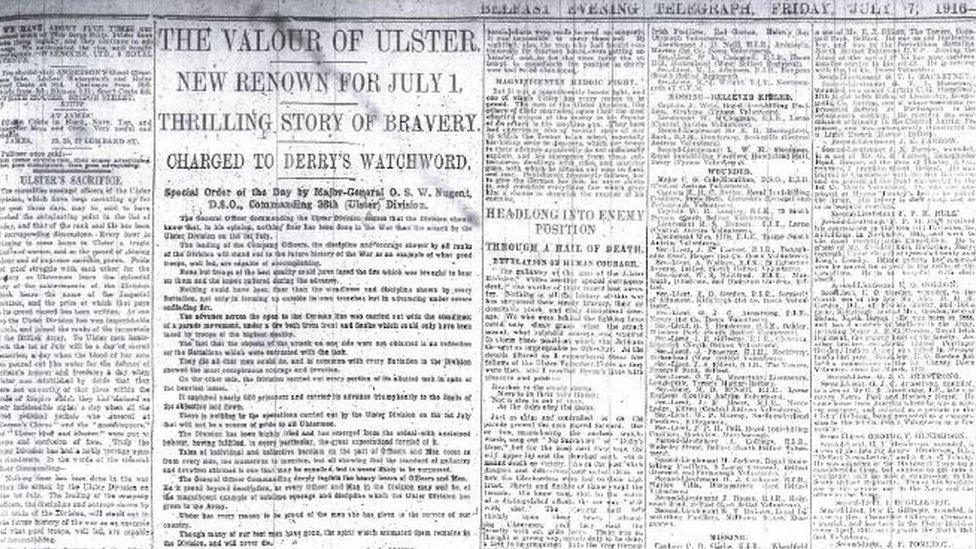
The Belfast Telegraph from Friday 7 July 1916
At 07:30 BST on Saturday 1 July, 1916, the Battle of the Somme was starting. In the midst of it, the 12,000 or so men of the 36th Ulster Division.
By the end of Sunday, more than 5,000 would be casualties of the battle. Around 2,000 would be dead.
Almost 700 miles away newspapers at home - the forefront source of news in its day - would face a week of trying to make sense of the unprecedented loss of life suffered by the division and British forces at the Somme.
Coverage from the Somme commemorations from @BBCNewsNI, external and Snapchat - BBCNewsNI
When the battle began, the Belfast Telegraph (or Belfast Evening Telegraph, as it was then known) was early with the news of a major push by Allied forces at the western front.
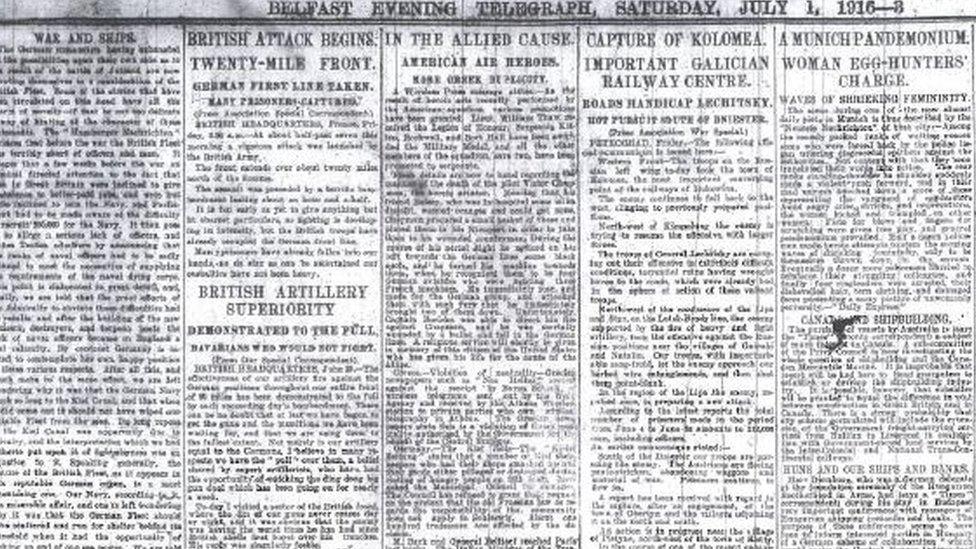
The first reports of the Battle of the Somme in the Belfast Telegraph on 1 July 1916
"British Attack Begins" reads the headline in that Saturday's edition, while the typo errors in the following article perhaps suggest a story that has arrived just before the paper went to print.
"At about half-past seven this morning, a vigorous attack was launched by the British Army," it said.
"The front extends over about twenty miles north of the Somme.
"It is too early as yet to give anything but the barest particulars, as fighting is developing in intensity, but the British troops have already occupied the Germany front line.
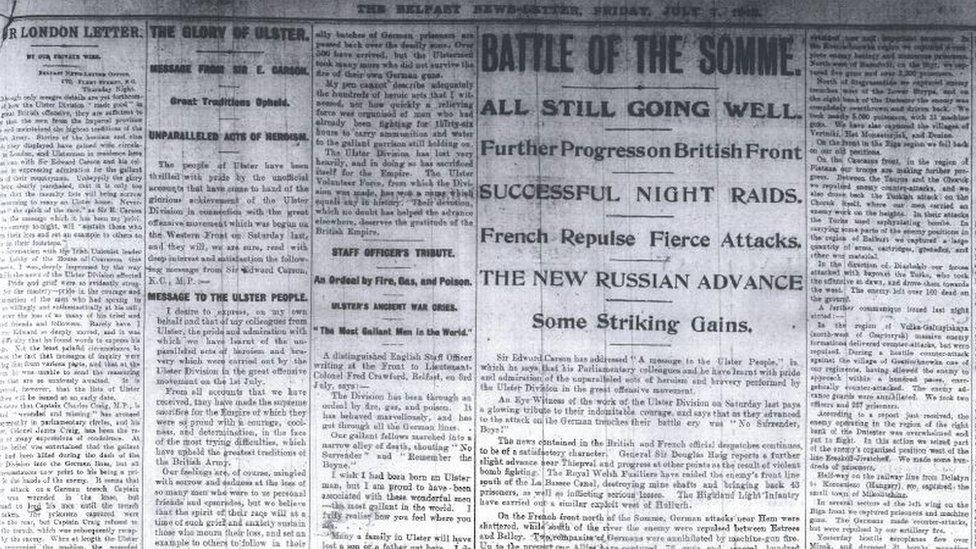
The News Letter's first reports of the battle were optimistic
"Many prisoners have already fallen into our hands, and as far as can be ascertained, our casualties have not been heavy."
These early signs of optimism were to turn horribly in the coming week.
The News Letter first carried a report in its edition on Monday, July 2 and it too carried good news to readers.
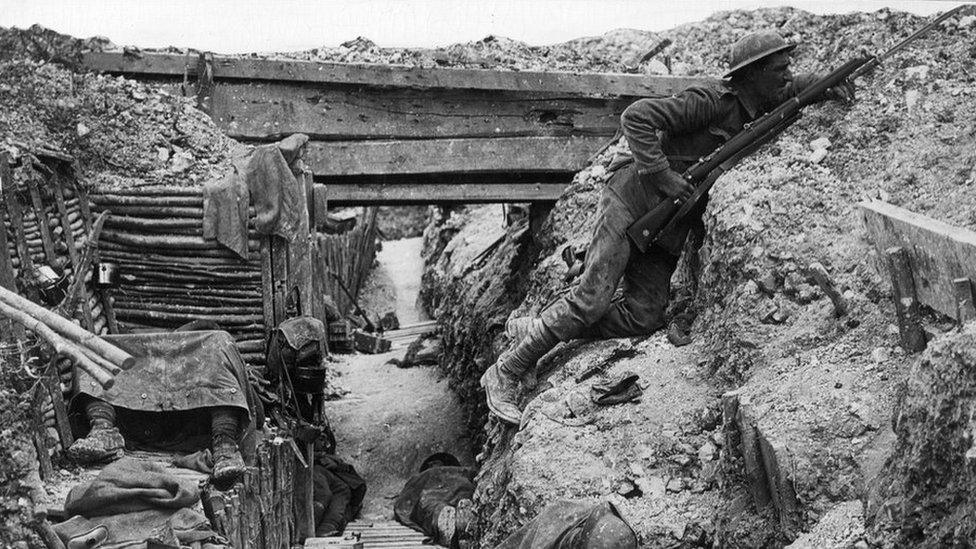
A British soldier looks out over the front line from a trench
"Great Anglo-French Offensive - Front of 25 Miles - A Brilliant Opening" reads the headline on page three.
It reports that the first German line had been "stormed" and the second line reached at "other points" with 2,500 German prisoners taken by the Allies.
Further down, the newspaper carries a report from Press Association that said:" Our losses are few, as the result of the efficacy of our preparatory work."
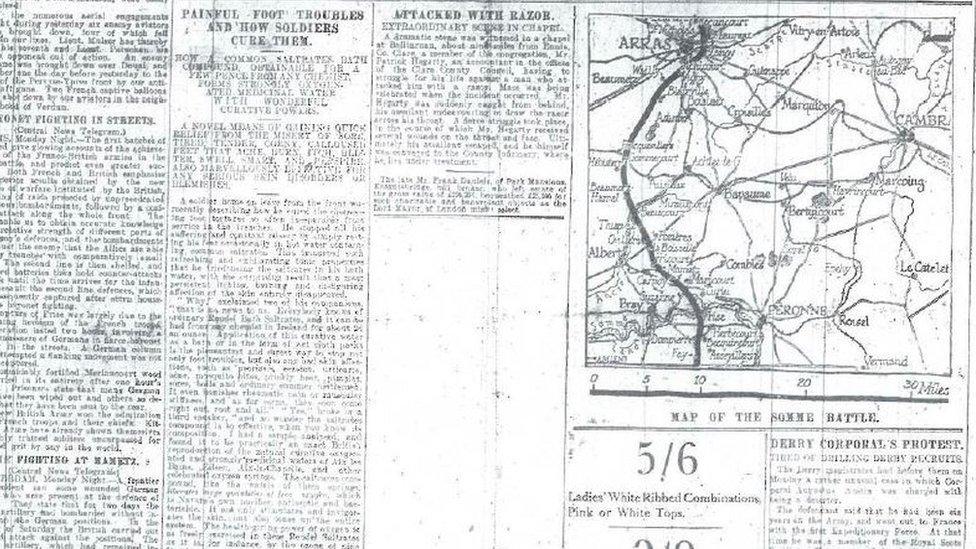
A map of the battlefield from the Belfast Telegraph on 5 July 1916
"The first day of the offensive is therefore very satisfactory," it adds. "The success is not a thunderbolt, as has happened earlier in similar operations but it is important above all because it is rich in promise."
The 'special correspondent' of the Belfast Telegraph likewise reports on 'Terrific Fighting' and of the men who marched towards the front line before the battle "singing songs with light and merry hearts, though not wholly ignorant of the ordeal that lay before them".
However, by Tuesday 4 July, word was beginning to reach Belfast of the enormity and brutality of the battle.
"Progress of Struggle" is the Belfast Telegraph headline. Under a report titled 'Baptism of Battle', it said: "Our losses are serious, as was fully expected, but it may be also said that they are not greater and are probably appreciably less than might have been counted on."
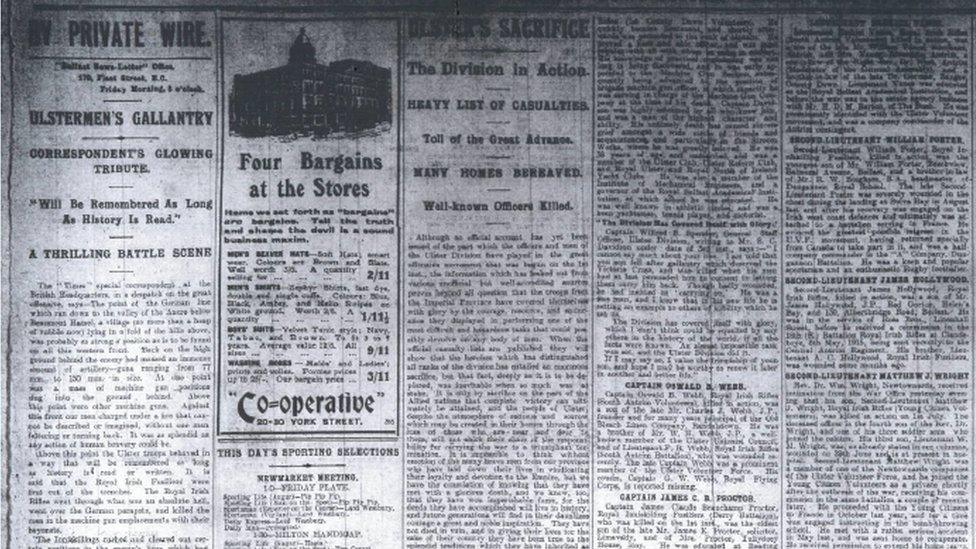
'Ulstermen's gallantry' and 'Ulster's sacrifice' headline the News Letter on Friday, 7 July 1916
By Wednesday, the central role of the Ulster Division, and its heroism, because a central narrative in the newspaper reporting.
"The Ulster members (says a London correspondent) received with natural concern news that the Ulster Division has sustained a very heavy list of casualties in the recent fighting.
"They find, however, some consolation in the knowledge that the Division bore itself with conspicuous gallantry in the recent advances."
The report, however, said that it was unable to secure a list of casualties.
The News Letter does carry an update on casualties, reporting on a number of families - from Dromore to Strabane, Newcastle to Bessbrook - who received telegrams from the War Office saying that their sons had been killed.
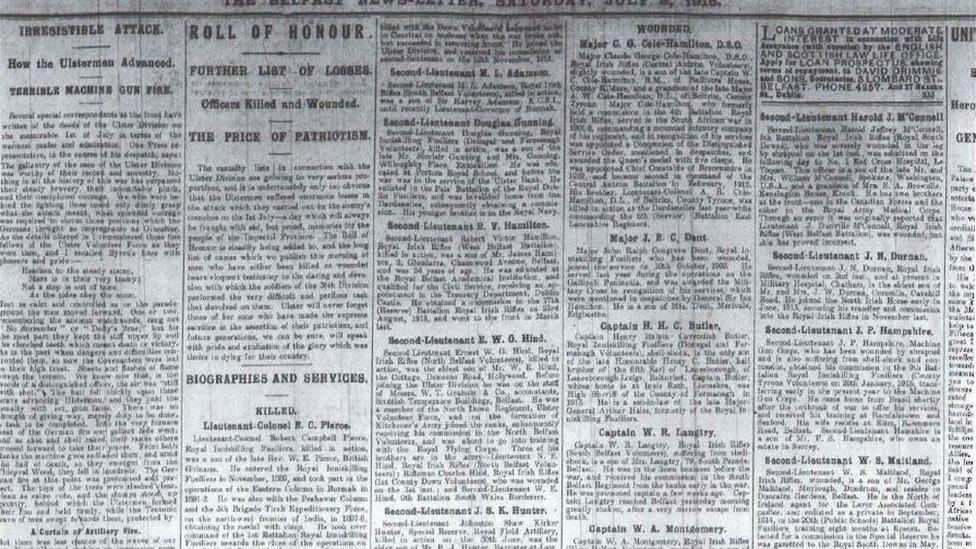
The News Letter printed this 'Roll of Honour', listing casualties from the battle, on Saturday, 8 July 1916
On Friday 7 July, just under a week since the battle began, the full, sombre picture of the battle's extent - and the bravery of the Ulster Division - had reached home.
"The Valour of Ulster" is the main headline in the Belfast Telegraph.
"No Surrender" is headed the News Letter's main editorial, in which it describes a first-hand account of how the Ulster Division had gone over the top in the opening hours of the battle.
"There is nothing in the operations carried out by the Ulster Division on the 1st of July that will not be a source if pride to all Ulstermen," wrote Maj Gen Nugent, the commanding officer of the Ulster Division.
The Belfast Telegraph's leader column offers this sombre context.
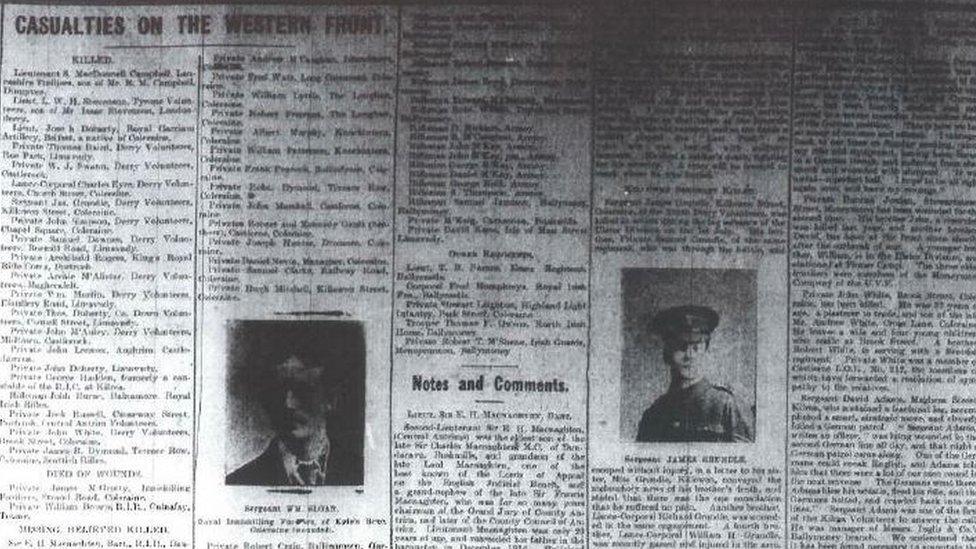
A list of casualties from the Northern Constitution on 15 July 1916
"Every hour is bringing to some home in Ulster a tragic missive of sorrow, and so the record of shining valour and of supreme sacrifice grows."
A first-hand account of the moment the Ulster Division went over the top describes an scene of intense bravery.
The newspaper reports that when the men went over the top the "Ulster Division almost immediately came under machine gun and rifle fire and the ranks were considerably thinned".
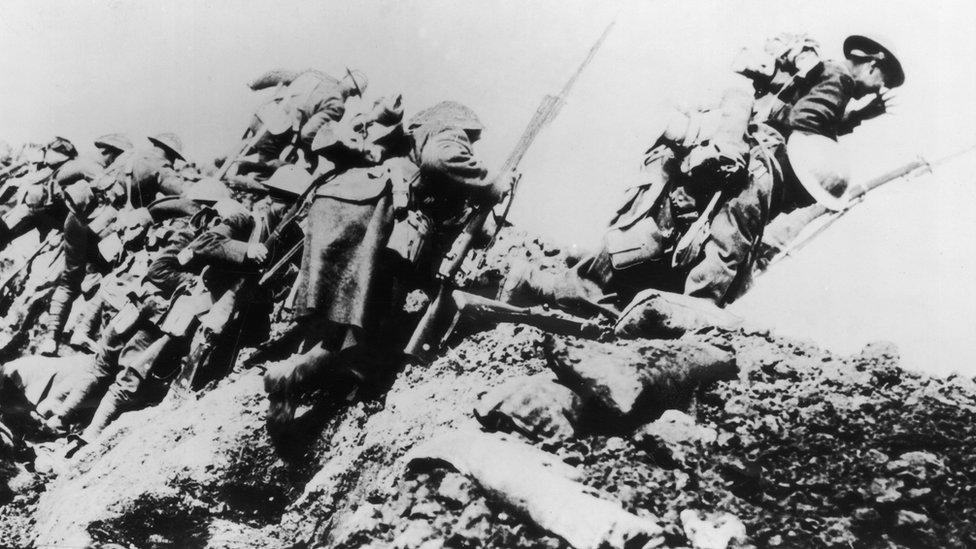
British troops climbing from their trench on the first day of 'The Big Push' on the Somme during World War One
"Yet through the mist and the smoke, the whole line continued to advance as if on parade," it added.
"Men kept dropping, but ever the cry arose over the din of battle, 'No Surrender'".
The loss of so many men in such a short period of time was even more keenly felt in local papers, where column after column was given over to listing the dead, wounded and missing.
The Northern Constitution, based on the north coast, printed a notice from the Limavady branch of the Orange Order on 15 July noting that the annual Twelfth commemorations had been cancelled.

A list of casualties from the Northern Constitution on 15 July 1916
"The Twelfth passed without the sight of a sash, the sound of a drum or the waving of a flag," it read.
Even the pages of the Derry Journal, a newspaper more preoccupied with the question of home rule rather than the war, felt the impact of the fighting.
Two columns titled 'Out of Action' list the wounded, missing and dead from the north west, among them a Lt J M Wilton, who was "well known in football circles", and Capt Cruickshank, who was editor of the Tyrone Constitution.
Throughout the week that July, families across Ireland were opening telegrams and newspapers that brought grief and sorrow with the news that thousands had died.
As the world remembers 100 years on, the words of the Belfast Telegraph appear prescient.
"At one step the Ulster Division has won imperishable laurels and joined the ranks of the immortals of the British Army.
"To Ulster men henceforth, the 1st of July will be a day of sacred memories."
In July, BBC Voices 16 will be showcasing a mix of newspaper clippings, extracts from diaries, letters and memoirs on Twitter and online to paint a vivid picture of The Battle of the Somme. You can follow @BBCVoices16 for daily updates on life in Ireland and on the Western Front.
- Published1 July 2016
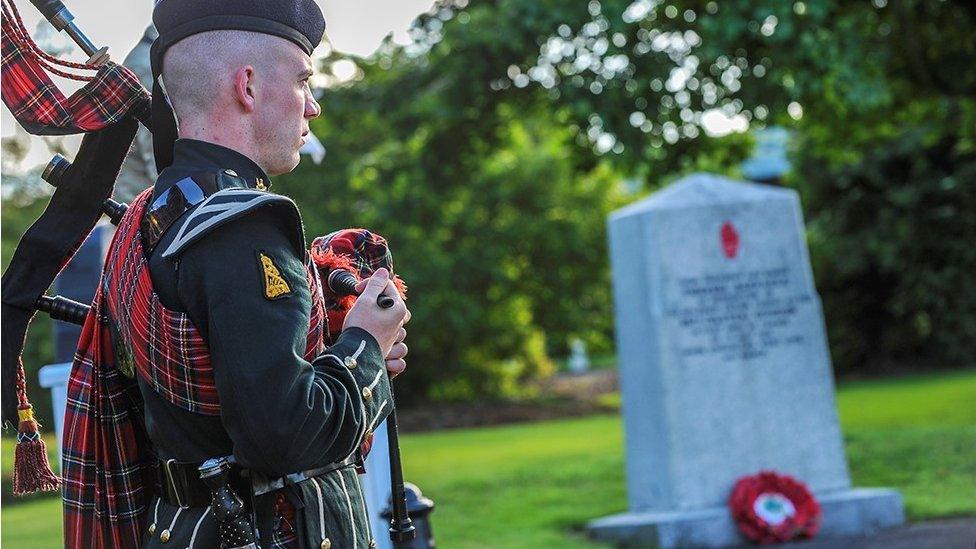
- Published1 July 2016
